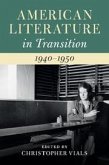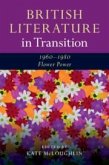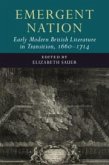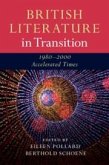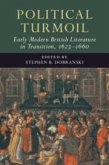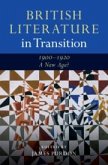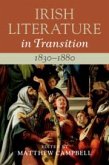British Literature in Transition, 1940-1960: Postwar
Herausgeber: Plain, Gill
British Literature in Transition, 1940-1960: Postwar
Herausgeber: Plain, Gill
- Gebundenes Buch
- Merkliste
- Auf die Merkliste
- Bewerten Bewerten
- Teilen
- Produkt teilen
- Produkterinnerung
- Produkterinnerung
Examines debates central to postwar British culture, showing the pressures of reconstruction and the mutual implication of war and peace.
Andere Kunden interessierten sich auch für
![American Literature in Transition, 1940-1950 American Literature in Transition, 1940-1950]() American Literature in Transition, 1940-1950134,99 €
American Literature in Transition, 1940-1950134,99 €![British Literature in Transition, 1960-1980: Flower Power British Literature in Transition, 1960-1980: Flower Power]() British Literature in Transition, 1960-1980: Flower Power134,99 €
British Literature in Transition, 1960-1980: Flower Power134,99 €![Emergent Nation: Early Modern British Literature in Transition, 1660-1714: Volume 3 Emergent Nation: Early Modern British Literature in Transition, 1660-1714: Volume 3]() Emergent Nation: Early Modern British Literature in Transition, 1660-1714: Volume 3151,99 €
Emergent Nation: Early Modern British Literature in Transition, 1660-1714: Volume 3151,99 €![British Literature in Transition, 1980-2000 British Literature in Transition, 1980-2000]() British Literature in Transition, 1980-2000134,99 €
British Literature in Transition, 1980-2000134,99 €![Political Turmoil: Early Modern British Literature in Transition, 1623-1660: Volume 2 Political Turmoil: Early Modern British Literature in Transition, 1623-1660: Volume 2]() Political Turmoil: Early Modern British Literature in Transition, 1623-1660: Volume 2151,99 €
Political Turmoil: Early Modern British Literature in Transition, 1623-1660: Volume 2151,99 €![British Literature in Transition, 1900-1920: A New Age? British Literature in Transition, 1900-1920: A New Age?]() British Literature in Transition, 1900-1920: A New Age?120,99 €
British Literature in Transition, 1900-1920: A New Age?120,99 €![Irish Literature in Transition, 1830-1880 Irish Literature in Transition, 1830-1880]() Irish Literature in Transition, 1830-1880145,99 €
Irish Literature in Transition, 1830-1880145,99 €-
-
-
Examines debates central to postwar British culture, showing the pressures of reconstruction and the mutual implication of war and peace.
Produktdetails
- Produktdetails
- Verlag: Cambridge University Press
- Seitenzahl: 438
- Erscheinungstermin: 20. Dezember 2018
- Englisch
- Abmessung: 235mm x 159mm x 25mm
- Gewicht: 748g
- ISBN-13: 9781107119017
- ISBN-10: 1107119014
- Artikelnr.: 52961459
- Herstellerkennzeichnung
- Libri GmbH
- Europaallee 1
- 36244 Bad Hersfeld
- gpsr@libri.de
- Verlag: Cambridge University Press
- Seitenzahl: 438
- Erscheinungstermin: 20. Dezember 2018
- Englisch
- Abmessung: 235mm x 159mm x 25mm
- Gewicht: 748g
- ISBN-13: 9781107119017
- ISBN-10: 1107119014
- Artikelnr.: 52961459
- Herstellerkennzeichnung
- Libri GmbH
- Europaallee 1
- 36244 Bad Hersfeld
- gpsr@libri.de
Introduction Gill Plain; Part I. Aftermath: The Beginning or the End?:
Introduction; 1. Slender means: the novel in the age of austerity Marina
MacKay; 2. Impossible elegies: poetry in transition 1940-1960 Nigel
Alderman; 3. Democracy and decentralisation: the Renaissance of British
theatre? Rebecca D'Monté; 4. National transitions: Wales, Scotland and
Northern Ireland Katie Gramich; 5. Heroes of austerity: genre in transition
Gill Plain; 6. Wireless writing, World War II and the West Indian literary
imagination James Procter; Part II. The Politics of Transition:
Introduction; 7. Narrating transitions to peace: fiction and film after war
Mark Rawlinson; 8. Poetry, the early Cold War and the idea of Europe Adam
Piette; 9. Horizon, encounter and mid-century geopolitics Thomas S. Davis;
10. Public intellectuals and the politics of literature: the causes and
collaborations of J. B. Priestley and Jacquetta Hawkes Priestley Ina
Habermann; 11. Prizing the nation: postwar children's fiction Lucy Pearson;
12. Artists of their time: the postwar battle for realism in literature and
painting Alice Ferrebe; Part III. Reconfigurations: Introduction; 13.
Demob: the postwar origins of the new nature writing Leo Mellor; 14. Old
haunts: childhood and home in postwar fiction Victoria Stewart; 15. New
uses of literacy: the blank page and writing in the aftermath of war Tracy
Hargreaves; 16. The pursuit of love: writing postwar desire Charlotte
Charteris; 17. Creating vital theatre: new voices in a time of transition
Claire Cochrane; Part IV. No Directions: Introduction; 18. Covert legacies
in postwar British fiction James Smith; 19. 'The sights are worse than the
journeys': travel writing at the mid-century Petra Rau; 20. The future and
the end: imagining catastrophe in mid-century British fiction Allan
Hepburn; 21. Exhausted literature: the postwar novel in repose Kate
McLoughlin.
Introduction; 1. Slender means: the novel in the age of austerity Marina
MacKay; 2. Impossible elegies: poetry in transition 1940-1960 Nigel
Alderman; 3. Democracy and decentralisation: the Renaissance of British
theatre? Rebecca D'Monté; 4. National transitions: Wales, Scotland and
Northern Ireland Katie Gramich; 5. Heroes of austerity: genre in transition
Gill Plain; 6. Wireless writing, World War II and the West Indian literary
imagination James Procter; Part II. The Politics of Transition:
Introduction; 7. Narrating transitions to peace: fiction and film after war
Mark Rawlinson; 8. Poetry, the early Cold War and the idea of Europe Adam
Piette; 9. Horizon, encounter and mid-century geopolitics Thomas S. Davis;
10. Public intellectuals and the politics of literature: the causes and
collaborations of J. B. Priestley and Jacquetta Hawkes Priestley Ina
Habermann; 11. Prizing the nation: postwar children's fiction Lucy Pearson;
12. Artists of their time: the postwar battle for realism in literature and
painting Alice Ferrebe; Part III. Reconfigurations: Introduction; 13.
Demob: the postwar origins of the new nature writing Leo Mellor; 14. Old
haunts: childhood and home in postwar fiction Victoria Stewart; 15. New
uses of literacy: the blank page and writing in the aftermath of war Tracy
Hargreaves; 16. The pursuit of love: writing postwar desire Charlotte
Charteris; 17. Creating vital theatre: new voices in a time of transition
Claire Cochrane; Part IV. No Directions: Introduction; 18. Covert legacies
in postwar British fiction James Smith; 19. 'The sights are worse than the
journeys': travel writing at the mid-century Petra Rau; 20. The future and
the end: imagining catastrophe in mid-century British fiction Allan
Hepburn; 21. Exhausted literature: the postwar novel in repose Kate
McLoughlin.
Introduction Gill Plain; Part I. Aftermath: The Beginning or the End?:
Introduction; 1. Slender means: the novel in the age of austerity Marina
MacKay; 2. Impossible elegies: poetry in transition 1940-1960 Nigel
Alderman; 3. Democracy and decentralisation: the Renaissance of British
theatre? Rebecca D'Monté; 4. National transitions: Wales, Scotland and
Northern Ireland Katie Gramich; 5. Heroes of austerity: genre in transition
Gill Plain; 6. Wireless writing, World War II and the West Indian literary
imagination James Procter; Part II. The Politics of Transition:
Introduction; 7. Narrating transitions to peace: fiction and film after war
Mark Rawlinson; 8. Poetry, the early Cold War and the idea of Europe Adam
Piette; 9. Horizon, encounter and mid-century geopolitics Thomas S. Davis;
10. Public intellectuals and the politics of literature: the causes and
collaborations of J. B. Priestley and Jacquetta Hawkes Priestley Ina
Habermann; 11. Prizing the nation: postwar children's fiction Lucy Pearson;
12. Artists of their time: the postwar battle for realism in literature and
painting Alice Ferrebe; Part III. Reconfigurations: Introduction; 13.
Demob: the postwar origins of the new nature writing Leo Mellor; 14. Old
haunts: childhood and home in postwar fiction Victoria Stewart; 15. New
uses of literacy: the blank page and writing in the aftermath of war Tracy
Hargreaves; 16. The pursuit of love: writing postwar desire Charlotte
Charteris; 17. Creating vital theatre: new voices in a time of transition
Claire Cochrane; Part IV. No Directions: Introduction; 18. Covert legacies
in postwar British fiction James Smith; 19. 'The sights are worse than the
journeys': travel writing at the mid-century Petra Rau; 20. The future and
the end: imagining catastrophe in mid-century British fiction Allan
Hepburn; 21. Exhausted literature: the postwar novel in repose Kate
McLoughlin.
Introduction; 1. Slender means: the novel in the age of austerity Marina
MacKay; 2. Impossible elegies: poetry in transition 1940-1960 Nigel
Alderman; 3. Democracy and decentralisation: the Renaissance of British
theatre? Rebecca D'Monté; 4. National transitions: Wales, Scotland and
Northern Ireland Katie Gramich; 5. Heroes of austerity: genre in transition
Gill Plain; 6. Wireless writing, World War II and the West Indian literary
imagination James Procter; Part II. The Politics of Transition:
Introduction; 7. Narrating transitions to peace: fiction and film after war
Mark Rawlinson; 8. Poetry, the early Cold War and the idea of Europe Adam
Piette; 9. Horizon, encounter and mid-century geopolitics Thomas S. Davis;
10. Public intellectuals and the politics of literature: the causes and
collaborations of J. B. Priestley and Jacquetta Hawkes Priestley Ina
Habermann; 11. Prizing the nation: postwar children's fiction Lucy Pearson;
12. Artists of their time: the postwar battle for realism in literature and
painting Alice Ferrebe; Part III. Reconfigurations: Introduction; 13.
Demob: the postwar origins of the new nature writing Leo Mellor; 14. Old
haunts: childhood and home in postwar fiction Victoria Stewart; 15. New
uses of literacy: the blank page and writing in the aftermath of war Tracy
Hargreaves; 16. The pursuit of love: writing postwar desire Charlotte
Charteris; 17. Creating vital theatre: new voices in a time of transition
Claire Cochrane; Part IV. No Directions: Introduction; 18. Covert legacies
in postwar British fiction James Smith; 19. 'The sights are worse than the
journeys': travel writing at the mid-century Petra Rau; 20. The future and
the end: imagining catastrophe in mid-century British fiction Allan
Hepburn; 21. Exhausted literature: the postwar novel in repose Kate
McLoughlin.


